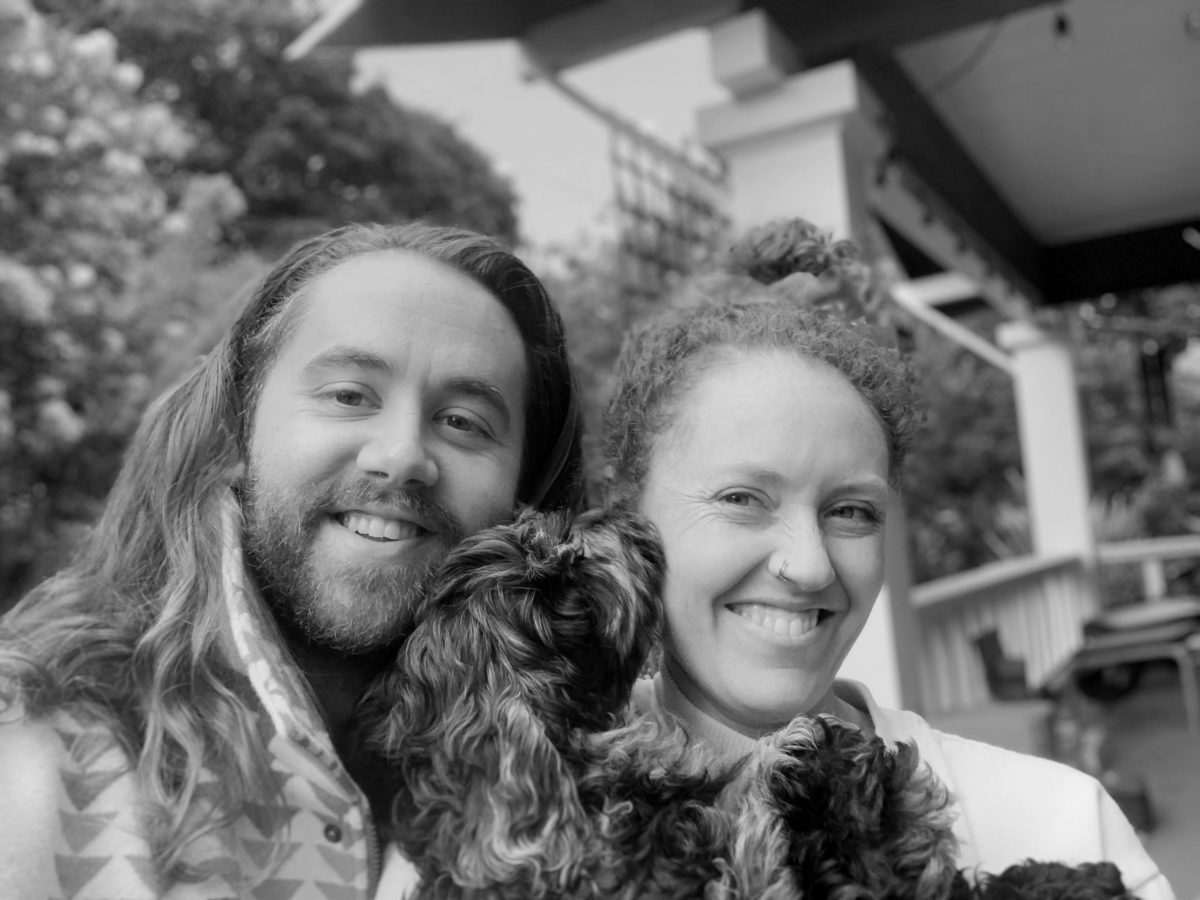Q&A with Nathan Howard and Leslie Wright
Howard, who was born and raised in Southeast Portland, is president of the cannabis farm East Fork Cultivars, which he founded in 2015 with his brother Aaron. They started the company to grow high-CBD strains of cannabis for their elder brother, Wesley, who regularly used the plant to alleviate symptoms of a rare neurological condition. Leslie, who grew up in San Diego, is a mental health nurse who is finishing her doctorate in psychiatric mental health at Oregon Health and Sciences University. They met when Leslie was working at the Bus Project (now called Next Up) and Nathan was a legislative aide for State Senator Mark Hass. “The Bus Project was putting on an end-of-the-legislative-session celebration and Nate came to the event. I invited him to sit at my table and the rest is history!” recalls Leslie.
Lately, the couple has been working with a group called the Plant Medicine Healing Alliance to persuade the City Council to decriminalize all psychedelics and protect home cultivation and ceremonial religious use of the plants. They just got a labradoodle puppy who they named Blue. When I spoke to the couple in late May, Howard was just getting ready to open Hemp Bar, East Fork’s all-ages CBD café, on 63rd and Foster.
How long have you guys lived in Sunnyside?
Nathan: Five years, in two different locations.
Leslie: We purchased this house two years ago. We fell into the opportunity in a very lucky white privilege way. Nate’s dad is a real estate agent. His first boss in Portland owns a ton of houses and he’s slowly been selling them off. So he was selling this house but never listed it. We did a seller-finance contract with him so we don’t have a traditional mortgage with a bank, which is great because I was about to start school and I probably wouldn’t have qualified because I wasn’t really working.
What do you love about Sunnyside?
Leslie: We really love Southeast because you can walk everywhere and a lot of our friends live here. And our street has got so many kids on it!
Nathan: I love that aspect. We probably have 16 kids within a block or so, and they’re frequently in our front yard, climbing our apple tree. We just got a dump truck of 10 yards of gravel delivered, and they’re all playing in the gravel and seeing if they can come over and hang out with our puppy Blue. We just love it.
I also love the open-mindedness of the neighborhood. There’s still some fear-based NIMBY stuff going on, but there’s such open-mindedness and I find that so energizing. And I’m starting to see way more diversity—including racial diversity. I’m really hoping that we’re trending towards more diversity in every sense of the word and less homogenous everything. I hope that continues and if that continues that I think I’ll start to love Sunnyside even more.
What’s one thing you would love to see change about Sunnyside?
Nathan: I guess I’ll answer that by saying what I’m afraid of. I’m afraid that Portland—Sunnyside included—is vastly underestimating the amount of in- migration that we’re going to continue to have over the coming decades. We’re vastly underestimating the amount of climate refugees the Pacific Northwest is going to be taking on, specifically the Portland Metro area. And so what I’m really fearful of is that liberal, progressive, open-minded, Sanctuary City Portland—seemingly overnight—could turn into a pretty xenophobic place if we don’t properly plan for a lot more people. So I’d like to see us begin to seriously consider changing that. And that means investing a bunch more infrastructure and housing and probably changing even more zoning laws in certain areas.
Leslie: I don’t know that I have much more to add. Making it more personal: I have friends who have chosen to live in North and Northeast because it’s more racially diverse. I’ve had friends of color who have told me about experiences where they would walk down a street in Sunnyside and people would stare at them from their porch, or smile in a way that was too familiar. Both send the message that they don’t belong and they feel unwelcome.
Why did you name your puppy Blue?
Leslie: I had a dog named Red growing up, so I thought it’d be on-theme. But then also we were talking to the woman who we bought him from, and she told us that he’s like this kind of old soul, kind of a dopey super chill dog, we thought like “Blue,” blues. That’s cool. That’ll work.

